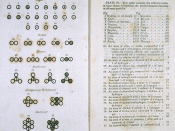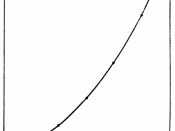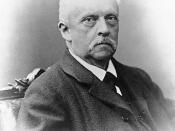"[Democritus:] Everything was composed of atoms, which moved randomly in a vacuum, in a void. They collided into each other by chance. This was the absolute negation of Aristotle's idea that everything had a purpose as divinely ordained [the theory of the Four Elements]."
Dr. Hugh Salzburg
Chemistry Historian
The idea that matter is composed of atoms goes back to the Greek philosophers, notably Democritus, and has never since been entirely lost sight of, though there have been periods when alternative views were more generally preferred. Newton's contemporaries, Robert Hooke and Robert Boyle, in particular, were atomists, but their interpretation of the sensation of heat as random motion of atoms was overshadowed for more than a century by the conception of heat as a subtle fluid dubbed caloric. It is a tribute to the strength of caloric theory that it enabled the French scientist Sadi Carnot to arrive at his great discoveries in thermodynamics.
In the end, however, the numerical rules for the chemical combination of different simple substances, together with the experiments on the conversion of work into heat by Benjamin Thompson (Count Rumford) and James Prescott Joule, led to the downfall of the theory of caloric. Nevertheless, the rise of ether theories to explain the transmission of light and electromagnetic forces through apparently empty space postponed for many decades the general reacceptance of the concept of atoms. The discovery in 1858 by the German scientist and philosopher Hermann von Helmholtz of the permanence of vortex motions in perfectly inviscid fluids encouraged the invention--throughout the latter half of the 19th century and especially in Great Britain--of models in which vortices in a structureless ether played the part otherwise assigned to atoms. In recent years the recognition that certain localized disturbances in a fluid, the so-called solitary waves, might persist...


